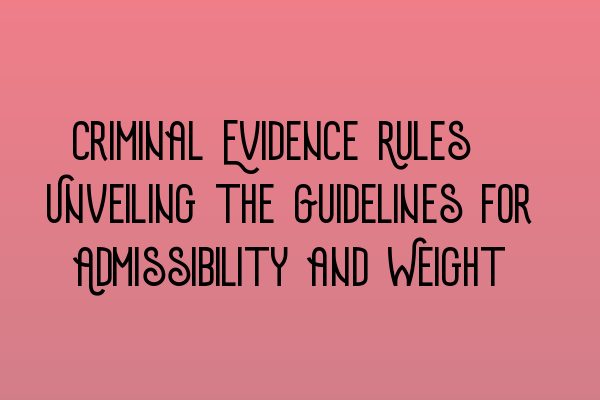Criminal Evidence Rules: Unveiling the Guidelines for Admissibility and Weight
When it comes to criminal law proceedings, the concept of evidence plays a crucial role. The admissibility and weight of evidence can significantly impact the outcome of a case. As a solicitor at SQE Criminal Law & Practice Law UK, I understand the importance of understanding the rules governing criminal evidence.
Admissibility of Evidence
The admissibility of evidence refers to whether the court allows certain pieces of evidence to be presented during a trial. The rules governing admissibility are designed to ensure a fair trial and prevent the inclusion of irrelevant or unreliable evidence. Understanding these rules is essential for all legal professionals, whether they are preparing for the SQE 1 or SQE 2 exams.
According to the SRA SQE Exam Dates, criminal law candidates should have a comprehensive understanding of the rules of evidence. These rules include the requirements of relevance, hearsay, character evidence, and the exclusion of illegally obtained evidence.
Relevance is a fundamental criterion for the admissibility of evidence. The evidence presented must have a logical connection to the issues in question. Legal practitioners should understand the various exceptions and exclusions to the relevance requirement to effectively argue for the admissibility or exclusion of evidence.
Hearsay evidence refers to statements made by a witness who does not testify in court. The admissibility of such evidence is restricted due to its potential unreliability. Legal professionals should be familiar with the exceptions to the hearsay rule, such as statements made under certain circumstances, like imminent death declarations.
Character evidence deals with the reputation or trait of an individual. It can only be introduced under specific circumstances, such as when the defendant’s character is an essential element of the charge. Knowing the precise guidelines for the admissibility of character evidence is crucial in criminal cases.
Furthermore, the exclusion of illegally obtained evidence is another critical aspect. Evidence that is obtained in violation of a person’s rights, such as evidence obtained through an unlawful search and seizure, is generally inadmissible. Legal professionals need to understand the legal safeguards surrounding the exclusion of such evidence.
Weight of Evidence
Once evidence is deemed admissible, it is then up to the fact-finder (judge or jury) to assess its weight. The weight of evidence refers to its probative value or the degree to which it proves or disproves a fact. Understanding how to present and challenge the weight of evidence is essential in criminal proceedings.
As prospective solicitors preparing for the SQE exams, it is crucial to develop strong analytical skills and an ability to effectively evaluate the weight of evidence. The SQE 1 Practice Exam Questions and SQE 1 Practice Mocks FLK1 FLK2 provided by SQE Criminal Law & Practice Law UK can help enhance your understanding of the weight of evidence and how to approach related questions in the exams.
When assessing the weight of evidence, legal professionals must consider factors such as credibility, consistency, corroboration, and the presence of any biases or motives that may affect the witness’s testimony. These factors play a significant role in determining the impact of evidence on the overall case.
It is crucial to remember that the weight of evidence is ultimately subjective and may vary depending on the trier of fact. Skilled solicitors understand the art of presenting and challenging evidence to maximize its weight or diminish its significance.
Conclusion
In summary, the rules of criminal evidence govern the admissibility and weight of evidence in legal proceedings. As aspiring solicitors, it is essential to have a thorough understanding of these rules, including the requirements of relevance, hearsay, character evidence, and the exclusion of illegally obtained evidence.
Developing strong analytical skills and knowledge in evaluating the weight of evidence is also crucial for success in the SQE exams and in a legal career. The SQE 2 Preparation Courses and SQE 1 Preparation Courses offered by SQE Criminal Law & Practice Law UK can provide comprehensive training in these areas to enhance your skills and knowledge.
Remember, staying up-to-date with the latest legal developments and participating in continuous professional development is essential to thrive in the field of criminal law. Stay informed and keep honing your expertise to become a successful criminal law solicitor.
